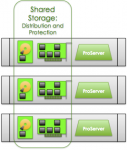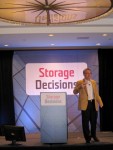Top-of-rack flash and bottom-of-rack disk makes a ton of sense in a world of virtualized, distributed storage. It fits with enterprise paradigms yet delivers real architectural change that could “move the needle” in a way that no centralized shared storage system ever will. SAN and NAS aren’t going away immediately, but this new storage architecture will be an attractive next-generation direction!
storage virtualization
Virtualized and Distributed Storage: This Time For Sure!
We were never able to achieve storage virtualization in mainstream enterprise IT because we lacked the ability to identify and move data non-disruptively. This has been solved by caching and distributed storage solutions, and it’s only a matter of time before the legacy need for centralized storage falls away.
Storage Decisions San Francisco 2011: Optimization and Virtualization
Tomorrow, I will be in San Francisco for TechTarget’s Storage Decisions conference. This show does a good job on the editorial side, suggesting timely topics and bringing in folks like Dennis Martin, Mark Staimer, and Jon Toigo. I will have two presentations on data reduction and storage virtualization in the main conference track – both are updated from my New York sessions.
Storage Decisions New York: Capacity Optimization
Later this month, I will be heading to New York for TechTarget’s Storage Decisions conference. I will have two presentations on data reduction and storage virtualization in the main conference track. Registration is free for qualified end-users, and I urge you to attend on September 19 and 20, 2011.
Storage Decisions Chicago: All About Capacity Optimization
Next month, I will be heading to Chicago for TechTarget’s Storage Decisions conference. This show does a good job on the editorial side, suggesting timely topics and bringing in independent voices like Howard Marks. I will have three presentations to give: Sessions on data reduction and storage virtualization in the main conference track, as well as a dinner discussion focusing on controlling the growth of data. Registration is free for qualified end-users, and I urge you to attend.



